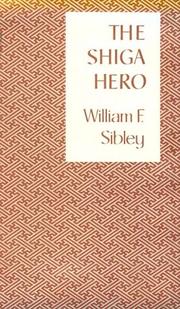| Listing 1 - 6 of 6 |
Sort by
|

ISBN: 1873410646 Year: 2007 Publisher: London Routledge
Abstract | Keywords | Export | Availability | Bookmark
 Loading...
Loading...Choose an application
- Reference Manager
- EndNote
- RefWorks (Direct export to RefWorks)
Shiga, Naoya, --- Criticism and interpretation. --- Shiga, Naoya

ISBN: 4000029401 400002941X Year: 1994 Publisher: 東京 岩波書店
Abstract | Keywords | Export | Availability | Bookmark
 Loading...
Loading...Choose an application
- Reference Manager
- EndNote
- RefWorks (Direct export to RefWorks)
Shiga, Naoya --- 志賀直哉

ISBN: 0226756203 Year: 1983 Publisher: University of Chicago press
Abstract | Keywords | Export | Availability | Bookmark
 Loading...
Loading...Choose an application
- Reference Manager
- EndNote
- RefWorks (Direct export to RefWorks)
Shiga, Naoya, --- 志賀直哉, --- 志贺直哉, --- Criticism and interpretation.
Book
ISBN: 9780739181034 9780739181027 Year: 2014 Volume: 15 *1 Publisher: Lanham [etc.] Kyoto Lexington Books International Research Center for Japanese Studies (Nichibunken)
Abstract | Keywords | Export | Availability | Bookmark
 Loading...
Loading...Choose an application
- Reference Manager
- EndNote
- RefWorks (Direct export to RefWorks)
J5931 --- Japan: Literature -- modern fiction and prose (1868- ) -- criticism --- Authors, Japanese --- Nature in literature --- Nature in poetry --- Shiga, Naoya, --- 志賀直哉, --- 志贺直哉, --- Criticism and interpretation.
Book
ISBN: 0739181041 9780739181041 9780739181027 0739181025 9780739181034 0739181033 1306408563 Year: 2014 Publisher: Lanham
Abstract | Keywords | Export | Availability | Bookmark
 Loading...
Loading...Choose an application
- Reference Manager
- EndNote
- RefWorks (Direct export to RefWorks)
This book deepens our understanding of the dynamics between nature and culture in Japanese thought and feeling. The author provides a detailed study of Shiga Naoya's nature-inspired literature as an example of Japanese people's engagement with nature.
LITERARY CRITICISM --- Asian / Japanese --- Nature in literature --- Authors, Japanese --- Languages & Literatures --- East Asian Languages & Literatures --- Japanese authors --- Nature in poetry --- Shiga, Naoya, --- Criticism and interpretation. --- 志賀直哉, --- 志贺直哉,
Book
ISBN: 022678424X 9780226784243 Year: 2011 Publisher: Chicago
Abstract | Keywords | Export | Availability | Bookmark
 Loading...
Loading...Choose an application
- Reference Manager
- EndNote
- RefWorks (Direct export to RefWorks)
In the years after World War II, Westerners and Japanese alike elevated Zen to the quintessence of spirituality in Japan. Pursuing the sources of Zen as a Japanese ideal, Shoji Yamada uncovers the surprising role of two cultural touchstones: Eugen Herrigel’s Zen in the Art of Archery and the Ryoanji dry-landscape rock garden. Yamada shows how both became facile conduits for exporting and importing Japanese culture. First published in German in 1948 and translated into Japanese in 1956, Herrigel’s book popularized ideas of Zen both in the West and in Japan. Yamada traces the prewar history of Japanese archery, reveals how Herrigel mistakenly came to understand it as a traditional practice, and explains why the Japanese themselves embraced his interpretation as spiritual discipline. Turning to Ryoanji, Yamada argues that this epitome of Zen in fact bears little relation to Buddhism and is best understood in relation to Chinese myth. For much of its modern history, Ryoanji was a weedy, neglected plot; only after its allegorical role in a 1949 Ozu film was it popularly linked to Zen. Westerners have had a part in redefining Ryoanji, but as in the case of archery, Yamada’s interest is primarily in how the Japanese themselves have invested this cultural site with new value through a spurious association with Zen.
Archery --- Civilization, Western --- Zen Buddhism --- Rock gardens, Japanese --- Religious aspects. --- Japanese influences. --- Study and teaching --- Herrigel, Eugen, --- Ryōanji Teien (Kyoto, Japan) --- japan, zen, philosophy, religion, spirituality, eugen herrigel, ryoanji, rock garden, archery, tradition, spiritual discipline, buddhism, myth, folk belief, focus, meditation, breathing, release, purposelessness, purposefulness, shooting, war, beauty, reflection, olympics, muro saisei, shiga naoya, nonfiction, eastern, western, advertising, self-help, martial arts, yoga, cultural appropriation, popular culture, history.
| Listing 1 - 6 of 6 |
Sort by
|

 Search
Search Feedback
Feedback About UniCat
About UniCat  Help
Help News
News